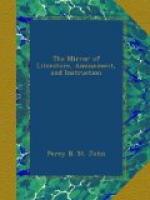“Thus the army, both in its numbers and management, was entirely at the mercy and under the direction of Muscovite despotism; the resources of the state were employed, without the legal control of the diet, to strengthen Russian tyranny, the press was enslaved, that no remonstrance might be made against Russian oppression; the citizens were arrested, imprisoned, and punished by a Russian military chieftain, without being brought to trial before the proper native tribunals; the legislative chambers were deprived of their just prerogatives; the national customs, habits, and feelings were hourly insulted; the citizens were beset with an infamous police, an deprived even of the melancholy consolation of complaint; thus, in short, every Polish right was violated—every article of the charter broken—and the whole efforts of an imperial savage, at the head of a strong military force, directed to efface from the countrymen of the Sobieskis and Kosciuszkos all the remains of the Polish character.
“This, it must be allowed, is a picture of tyranny and misgovernment sufficiently appalling to justify the resistance of any people, but more especially that of a people which had long been accustomed to even a licentious freedom, which was proud of its national honour and ancient renown; which entertained such a veneration for its laws and usages as to preserve for two centuries the liberum veto and the rights of elective monarchy, the source of all its calamities; and which had the positive stipulations of its sovereign for the preservation of its national rights. But, like most general pictures, its impression may be diminished by its generality. We shall therefore make no apology for introducing, on the authority of an Englishman who had been twelve years in Poland, a few facts to give the character of precision and truth to the outline. In the fortress of Zamosc twelve state prisoners were found, some of whom had been incarcerated for six years without having undergone a trial, and whose names were only known to the commander of the castle. In the dungeons of Marienanski, in Warsaw, was found a victim of the Russian police, who had been kept in solitary confinement for ten years, and whose fate was entirely unknown to his friends and relatives. Respectable inhabitants of Warsaw were often taken and flogged before the grand duke without the formality of a trial, or the specification of a charge. Some were even, in the same unlawful




